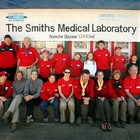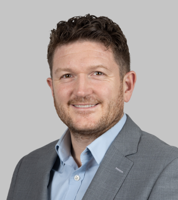29 March 2007
 SMITHS Medical, part of the global technology business Smiths Group, today announces the opening of the Smiths Medical High Altitude Laboratory at Namche Bazaar, Nepal at 3,400m, (11,154 ft).
SMITHS Medical, part of the global technology business Smiths Group, today announces the opening of the Smiths Medical High Altitude Laboratory at Namche Bazaar, Nepal at 3,400m, (11,154 ft).
It is one of four main laboratories for Caudwell Xtreme Everest, the largest human biology study ever performed at high altitude: over 200 volunteers will be studied by around 60 doctors and scientists as they climb progressively higher to Everest base camp at 5,300 metres (17,225 ft). More detailed research will be performed on a group of experienced mountaineer scientists who aim to climb to the summit of Everest at 8,850m (29,035 ft) to take the first measurement of arterial blood oxygen on the mountains summit.
Caudwell Xtreme Everest is being conducted by doctors and scientists from University College London (UCL) and it is supported by John Caudwell, the entrepreneur and founder of The Caudwell Charity who is also a volunteer on the trek to Everest base camp.
The laboratory is also the base for the Smiths Medical Young Everest Study (SMYES), which will investigate how nine British children cope with the low oxygen levels in the foothills of the worlds highest mountain. SMYES is being conducted by doctors and scientists from Great Ormond Street Hospital (GOSH) and UCLs Institute of Child Health. It is supported by Smiths Medical, which is a world leader in respiratory care.
The doctors and scientists involved in Caudwell Xtreme Everest hope to make links between the human body at its limits during critical illness and the changes that occur to individuals at high altitude.
In common with intensive care patients, high altitude mountaineers have a low level of oxygen in their blood.
The doctors and scientists involved in SMYES hope to improve the chances of survival for very sick children by investigating how healthy childrens bodies cope and adapt at altitude. It also aims to improve the quality of life of those with chronic/long term lung diseases and to develop new methods of detecting and treating children with disturbed sleep patterns.
The Smiths Medical High Altitude Laboratory will be run by Professor Monty Mythen, the Smiths Medical Chair of Anaesthesia and Critical Care at University College London.
Professor Mythen said: What we learn from these people as they push themselves to the limit of human performance, will help us to understand what is happening to patients fighting for their lives on intensive care units.
At sea level, you cant tell who will cope and who wont. On Everest, if we can understand more about what makes someone a rapid adapter, we may be able to find the switches and adapters to help the others cope.
The laboratory, which opens on April 1 and will operate until the end of May, will be equipped with advanced medical testing equipment including heart and lung function monitors and cardio pulmonary exercise testing equipment.
Smiths Medical, which donated medical equipment to the expedition, pioneered the development of single use devices to help people breathe. It has contributed around 4 million towards medical research at UCL over the last decade.
Srini Seshadri, Group Managing Director of Smiths Medical, said: Smiths Medical has been a world leader in respiratory care for five decades with our Portex brand products.
We have also enjoyed a long-standing relationship with UCL in developing cutting edge solutions to difficult respiratory issues and we are delighted to be supporting the Smiths Medical High Altitude Laboratory, which is one of the most advanced laboratories ever installed at altitude.
For more information on Caudwell Xtreme Everest, please go to: www.xtreme-everest.co.uk . For more information on the Smiths Medical Young Everest Study please go to www.smiths-medical.com/youngeverest
Caudwell Xtreme Everest (CXE)
Caudwell Xtreme Everest is a research project coordinated by the UCL Centre for Altitude, Space and Extreme (CASE) environment medicine - doctors and scientists studying human systems stretched to breaking point in extreme environments to increase our understanding of critically ill patients. The goal is to place a research team on the summit of Mount Everest in 2007 and make the first ever measurement of the level of oxygen in human blood at this altitude. This is the centrepiece of an extensive programme of research into hypoxia (low oxygen levels) and human performance at extreme altitude aimed at improving the care of the critically ill and other patients where hypoxia is a fundamental problem. The Caudwell Xtreme Everest expedition is being sponsored by John Caudwell, a businessman and founder of The Caudwell Charity. Scientific studies in the run-up to the expedition have been supported by a research grant from medical gases specialist BOC Medical. www.xtreme-everest.co.uk
Smiths Medical Young Everest Study (SMYES)
SMYES is a research project coordinated by Great Ormond Street Hospital for Children (GOSH) and University College Londons Institute of Child Health (ICH). Doctors do not yet fully understand childrens responses to low oxygen levels, which are common in very sick children and can be fatal. SMYES aims to develop new treatments for critically ill children and those with breathing and sleep problems by investigating how healthy children, aged 6 to 13, cope with low oxygen levels on the worlds highest mountain. The study is supported by Smiths Medical, part of the global technology business Smiths Group. Smiths Medical pioneered the development of single use devices to help people breathe and continues to be a world leader in respiratory care. It has contributed around 4 million towards medical research at University College London over the last decade. For more information on the Smiths Medical Young Everest Study, please go to www.smiths-medical.com/youngeverest
Great Ormond Street Hospital for Children
Great Ormond Street Hospital for Children NHS Trust (GOSH) is a national centre of excellence in the provision of specialist children's health care, currently delivering the widest range of specialist care of any children's hospital in the UK. It works in partnership with the UCL Institute of Child Health (ICH), part of University College London, and together they form the largest paediatric research and teaching centre outside the Americas. It was recently designated the only Biomedical Specialist Academic Centre for paediatrics.
Institute of Child Health, University College London
In partnership with Great Ormond Street Hospital and as part of University College London, the ICH is the leading British academic research institution for child health. It was established in 1945 and currently has 472 staff. It supports 46 professorships and currently 110 Mphil/PhD students and 22 Doctors of Medicine/Master of Surgery students are studying at the ICH.
General media enquiries
Contact our global media and communications team at:

Please note – the press team can only answer enquiries from accredited members of the press.
Related articles

John Crane signs global framework agreement with leading international energy company
Read our latest company news as John Crane signs a global framework agreement with a leading international energy company
Find out more

Smiths Group plc sale of Smiths Detection
Find out more

Smiths Group plc – Q1 FY2026 Trading Update
Find out more

